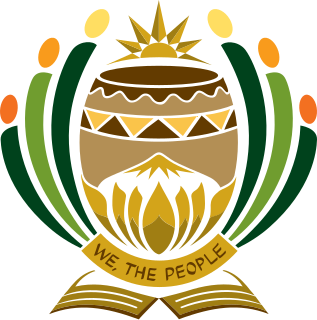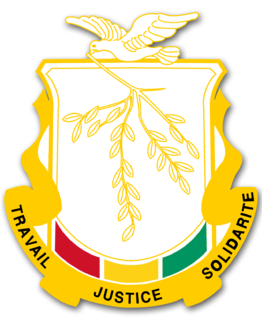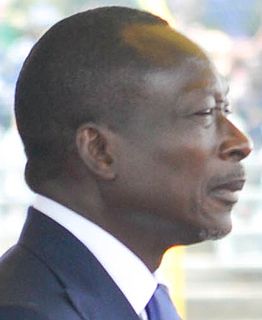The Republic of Benin was formed in 1960 when the colony of French Dahomey gained independence from France. Prior to this, the area that is now the Republic of Benin was divided largely between two coastal kingdoms, Dahomey and Porto-Novo, and a large area of various tribes in the north. The French assembled these various groups together into the colony of French Dahomey, which was part of the various colonies of French West Africa from 1904 until 1960. In the independence era, the republic was extremely unstable for the first decade and a half of existence, with multiple governments and multiple military coups. In 1972, Mathieu Kérékou led a military coup deposing the Presidential Council and appointing himself as the head of state, a position he held until 1991 when the country returned to multiparty elections. Since that point, the state has held multiple presidential and legislative elections and a number of different parties have become important.

The Politics of Benin take place in the framework of a presidential representative democratic republic, wherein the President of Benin is both head of state and head of government, and of a multi-party system. Executive power is exercised by the government. Legislative power is vested in both the government and the legislature. The Judiciary is independent of the executive and the legislature. The current political system is derived from the 1990 Constitution of Benin and the subsequent transition to democracy in 1991. The Economist Intelligence Unit has rated Benin as "hybrid regime" in 2016.

The Parliament of South Africa is South Africa's legislature and under the country's current Constitution is composed of the National Assembly and the National Council of Provinces.

Mathieu Kérékou was a Beninese politician who served as President of Benin from 1972 to 1991 and again from 1996 to 2006. After seizing power in a military coup, he ruled the country for 19 years, for most of that time under an officially Marxist–Leninist ideology, before he was stripped of his powers by the National Conference of 1990. He was defeated in the 1991 presidential election but was returned to the presidency in the 1996 election and controversially re-elected in 2001.

Elections in Benin take place within the framework of a multi-party democracy and a presidential system. Both the President and the National Assembly are directly elected by voters, with elections organised by the Autonomous National Electoral Commission (CENA).

Elections in Guinea-Bissau take place within the framework of a multi-party democracy and a semi-presidential system. Both the President and the National People's Assembly are directly elected by voters.

Elections in Rwanda take place within the framework of a multi-party democracy and a presidential system. The President and majority of members of the Chamber of Deputies are directly elected, whilst the Senate is indirectly elected and partly appointed.

Presidential elections were held in Benin on 5 March 2006. Long-time president Mathieu Kérékou was barred from running again by a two-term limit and an age limit of 70 years for candidates; in July 2005 he signalled that he would not seek to change the constitution, as has been done in some other African countries, so that he could run again. Kérékou's long-time rival Nicéphore Soglo was also barred from standing due to his age. With both of the men who had been the country's leading political figures for many years unable to contest the election, it had a level of openness and unpredictability that is uncommon to African presidential elections. Since no candidate won a majority, a second round was held between the two leading candidates on 19 March; Yayi Boni won the election and took office in April.

The unicameral National Assembly is Benin's legislative body.

The People's Republic of Benin was a socialist state located in the Gulf of Guinea on the African continent, which would become present-day Benin. The People's Republic was established on 30 November 1975, after the 1972 coup d'état in the Republic of Dahomey. It effectively lasted until 1 March 1990, with the adoption of a new constitution, and the abolition of Marxism-Leninism in the nation in 1989.

A constitutional referendum was held in Benin on 2 December 1990. The main issues were changing the political system to a multi-party system, with a secondary issue as to whether there should be age limits for the President. The referendum passed with 93.2% of voters approving the change to a multi-party system and 73.3% in favour of age limits.

Elections for the National Revolutionary Assembly were held in Benin on 10 June 1984. They were originally scheduled for 1983, but the term of the Assembly was extended by 18 months. At the time, the country was a one-party state under the People's Revolutionary Party of Benin, with voters given the choice of approving the party's list of 196 candidates or not. The list was ultimately approved by 98.2% of voters, with a 93.1% turnout. Following the election, Mathieu Kérékou was elected President (unopposed) by the Assembly on 31 July.

Parliamentary elections were held in Benin on 18 June 1989. At the time, the country was a one-party state under the People's Revolutionary Party of Benin, with voters given the choice of approving the party's list of 206 candidates for the National Revolutionary Assembly or not. In the election, 89.6% of voters approved the list, with 9.7% voting against. Turnout was 86%.

General elections were held in Zambia on 5 December 1973. They were the first elections held since the country was formally declared a one-party state in August, with the United National Independence Party (UNIP) as the only legally permitted party. UNIP leader Kenneth Kaunda was automatically elected to a third five-year term as President, and was confirmed in office via a referendum in which 88.8% of voters approved his candidacy. UNIP also won all 125 seats in the National Assembly. Voter turnout was 39% of the 1,746,107 registered voters for the presidential election, and 33% for the National Assembly election.

Parliamentary elections were held in Somalia on 30 December 1979.

General elections were held in Guinea on 1 January 1968 to elect a President and National Assembly. The country was a one-party state at the time, with the Democratic Party of Guinea – African Democratic Rally as the sole legal party. Its leader Ahmed Sékou Touré was re-elected President unopposed, whilst in the National Assembly elections the party produced a list of 75 candidates for the 75 seats, which voters were asked to approve. Voter turnout was 99.7%.

Parliamentary elections were held in Cape Verde in June 1975 in preparation for independence from Portugal on 5 July. The African Party for the Independence of Guinea and Cape Verde was the sole legal party at the time, with voters being asked to approve or reject a PAIGC list of 56 members for the National People's Assembly. Its party leader was Aristides Pereira. The list was approved by 95.6% of voters, with a turnout of 86.7%.

Presidential elections were held in Benin on 6 March 2016, having been delayed by one week due to logistical constraints. Incumbent President Thomas Boni Yayi was at the end of his second presidential term and was constitutionally barred from running for a third. The elections grabbed the interest of many of the country's top businessmen, resulting in over 30 candidates running for the presidency. A second round was held on 20 March, in which businessman Patrice Talon defeated Prime Minister Lionel Zinsou.














